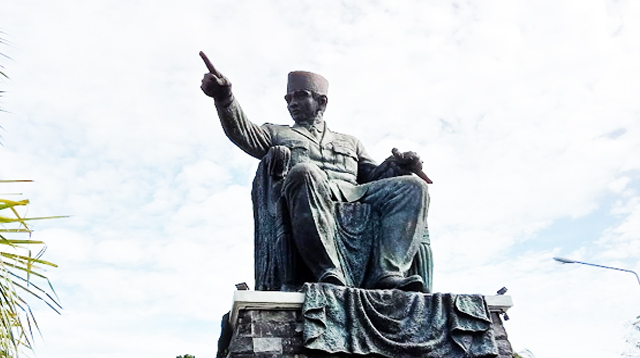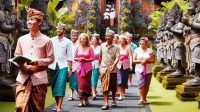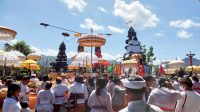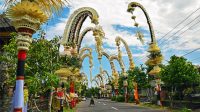SOEKARNO, born on June 6, 1901, in Java (then part of the Dutch East Indies), played a pivotal role in Indonesia’s struggle for independence. His leadership and idealism left an indelible mark on the nation.
He has Balinese blood as his mother was from Singaraja, precisely Banjar Bale Agung, named Nyoman Rai Srimben while his father named Raden Soekemi Sosrodihardjo.
Soekarno’s idealism and struggle were instrumental in shaping modern Indonesia. His vision of a unified, independent, and socially just nation guided his actions and inspired millions of Indonesians. Despite facing immense challenges, his relentless pursuit of independence and his foundational contributions to the country’s political philosophy left an enduring legacy that continues to influence Indonesia today.
1. Political Activism
Soekarno was actively involved in political movements from a young age. He co-founded the Indonesian National Party (PNI) in 1927, which aimed to achieve independence through non-cooperation with the Dutch colonial authorities and promoting mass mobilization and education.
2. Imprisonment and Exile
His activism led to multiple imprisonments and periods of exile by the Dutch authorities. Despite these hardships, Soekarno’s resolve only strengthened. He continued to write and communicate with fellow nationalists, spreading his ideas and garnering support.
3. Collaboration with Japanese Occupation Forces
During World War II, when Japan occupied Indonesia, Soekarno strategically collaborated with the Japanese, hoping to leverage their anti-Dutch stance to advance the cause of Indonesian independence.
While controversial, this collaboration provided him with a platform to mobilize the Indonesian population and prepare for eventual independence.
4. Proclamation of Independence
On August 17, 1945, following Japan’s surrender in World War II, Soekarno and Mohammad Hatta declared Indonesia’s independence. The proclamation marked the culmination of decades of struggle and became a pivotal moment in Indonesian history.
5. Diplomacy and Armed Struggle
Post-proclamation, Soekarno led both diplomatic and military efforts to secure international recognition and defend against Dutch attempts to reassert control. The subsequent Indonesian National Revolution (1945-1949) involved fierce fighting, negotiations, and a sustained campaign to consolidate independence.
6. Leadership in Early Years of Independence
As the first President of Indonesia, Soekarno focused on nation-building. He promoted unity, economic development, and international diplomacy. He also played a significant role in the Bandung Conference of 1955, which positioned
Indonesia as a leader in the newly emerging non-aligned movement.
In the meantime, Soekarno also had great idealism held during the struggle and after it.
1. Nationalism
Soekarno’s vision was rooted in a profound sense of nationalism. He believed in the unity and identity of the Indonesian people, transcending ethnic, religious, and regional differences. His famous slogan, “Indonesia Merdeka” (Independent Indonesia), encapsulated his dream of a sovereign nation free from colonial rule.
2. Anti-Colonialism
Soekarno’s idealism was characterized by a staunch opposition to colonialism. He viewed colonial powers as oppressors that exploited Indonesian resources and subjugated its people. His speeches and writings often emphasized the need to overthrow colonial domination and establish an independent state.
3. Social Justice
Social justice was a cornerstone of Soekarno’s ideology. He envisioned an Indonesia where wealth and resources were equitably distributed, and the common people were empowered. His focus was on improving the lives of the marginalized and ensuring that independence translated into real economic and social benefits for all Indonesians.
4. Pancasila
Soekarno formulated Pancasila, the philosophical foundation of the Indonesian state. It consisted of five principles: belief in one God, humanitarianism, national unity, democracy, and social justice. Pancasila was designed to unite the diverse Indonesian archipelago under a common ideological framework.
5. Non-Alignment
In the context of the Cold War, Soekarno championed a non-aligned movement. He believed Indonesia should not be a pawn in the geopolitical struggles of superpowers but should chart its own independent path, maintaining sovereignty and neutrality while promoting peace and cooperation globally.
Soekarno’s Love for Bali and Cultural Preservation
1. Art Connoisseur: Soekarno was not only a political leader but also an art lover. After Indonesia’s proclamation in August 1945, he actively collected artworks. His extensive collection included pieces by Indonesian artists and European painters like Rudolf Bonnet, Willem Hofker, and Roland Strasser. Notably, he acquired works by Adrien Jean Le Mayeur de Merprès, the “Paul Gauguin of Bali.” Le Mayeur settled in Bali and painted half-naked dancers, often featuring his Balinese wife, Ni Pollok.
2. Bali’s Beauty: Soekarno appreciated Bali’s natural beauty, culture, and traditions. The island’s lush landscapes, rice paddies, temples, and village scenes captivated him. These subjects became favorites for both local and European artists, capturing the essence of “Beautiful Indies romance” in their paintings.
3. Cultural Preservation: Soekarno recognized the importance of preserving Indonesia’s rich cultural heritage. His love for Bali extended beyond aesthetics; he understood that cultural preservation was vital for national identity. Bali’s unique traditions, dance, and art fascinated him, and he actively promoted their preservation.
Legacy
Soekarno’s legacy endures through Indonesia’s independence and its vibrant cultural tapestry. His vision, idealism, and love for Bali continue to inspire generations, reminding us of the importance of unity, justice, and cultural heritage.










